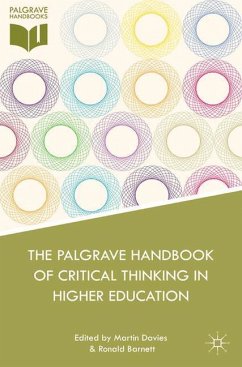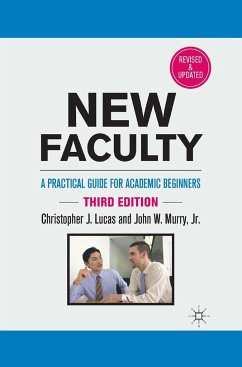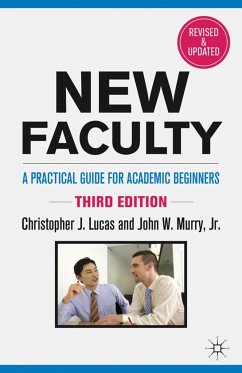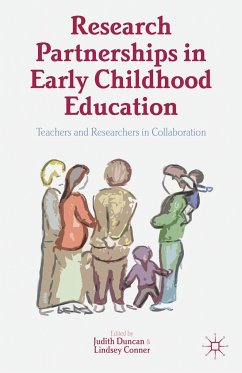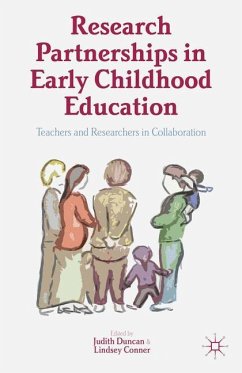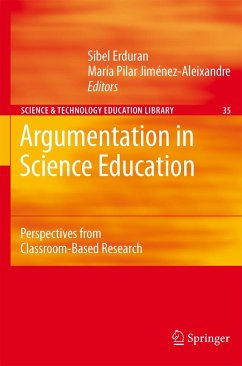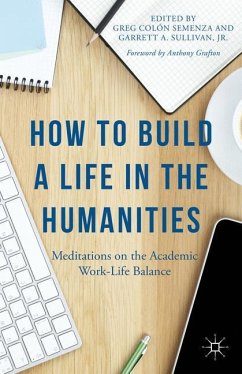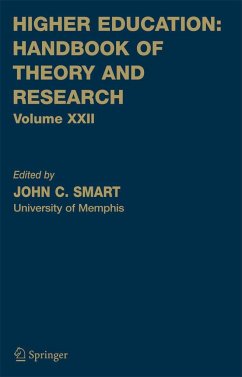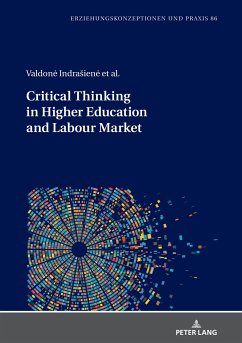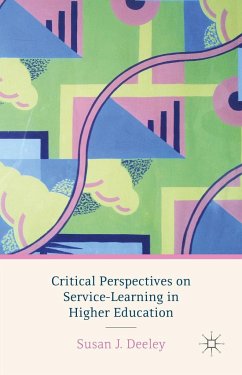Nicht lieferbar
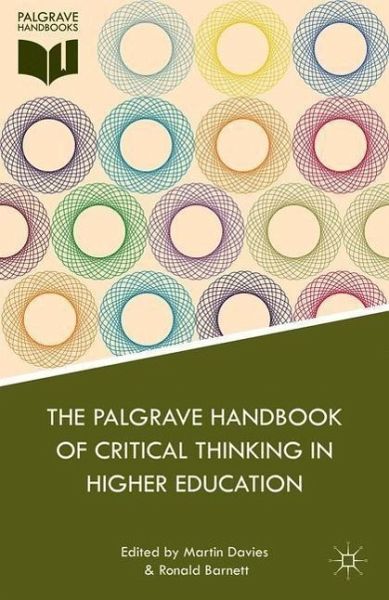
Gebundenes Buch
The Palgrave Handbook of Critical Thinking in Higher Education
Versandkostenfrei!
Nicht lieferbar





The Palgrave Handbook of Critical Thinking in Higher Education provides a single compendium on the nature, function, and applications of critical thinking. This book brings together the work of top researchers on critical thinking worldwide, covering questions of definition, pedagogy, curriculum, assessment, research, policy, and application.
Chapter 23 is available open access under a Creative Commons Attribution BY-NC-ND 4.0 license via link.springer.com.
Chapter 23 is available open access under a Creative Commons Attribution BY-NC-ND 4.0 license via link.springer.com.
Richard Andrews, University of London, UK Sharon Bailin, Simon Fraser University, Canada Maha Bali, American University in Cairo, Egypt Mark Battersby, Canada Margaret Blackie, Stellenbosch University, South Africa Tracy Bowell, University of Waikato, New Zealand Eva M. Brodin, Lund University, Sweden Stephen Brookfield, University of St. Thomas, USA Lorelle Burton, University of Southern Queensland, Australia Elmarie Costandius, Stellenbosch University, South Africa Sharon K Chirgwin, Menzies School of Health Research, Australia Stephen Cowden, Coventry University, UK Peter Ellerton, University of Queensland, Australia Robert H. Ennis, Education at the University of Illinois, USA Sandra Grace, Southern Cross University, Australia Paul Green, Mount St. Mary's College, USA Phil Griffiths, University of Southern Queensland, Australia Benjamin Hamby, Coastal Carolina University, USA Sara Hammer, University of Southern Queensland, Australia Maralee Harrell, Carnegie Mellon University, USA Denise Higgins, Australian National University, Australia David Hitchcock, McMaster University, Canada Susan Howitt, Australian National University, Australia Henk Huijser, Batchelor Institute of Indigenous Tertiary Education, Australia Alan Jones, Macquarie University, Australia Anna Jones, Glasgow Caledonian University, UK Justine Kingsbury, University of Waikato, New Zealand Masuo Koyasu, Kyoto University, Japan Takashi Kusumi, Kyoto University, Japan Joe Lau, The University of Hong Kong, Hong Kong Brenda Leibowitz, University of Johannesburg, South Africa Stephen M. Llano, St. John's University, USA Jason Lodge, University of Melbourne, Australia Beatrice Lok, Chinese University of Hong Kong, Hong Kong Rhoda Malgas, Stellenbosch University, South Africa Emmanuel Manalo, Waseda University, Japan Karl Maton, University of Sydney, Australia Celina McEwen, Charles Sturt University, Australia Yasushi Michita, University of the Ryukyus, Japan Ian Nell, Stellenbosch University, South Africa Nancy November, University of Auckland, New Zealand Erin O'Connor, Queensland University of Technology, Australia Paul J Orrock, Southern Cross University, Australia Pamela Roberts, Australian National University, Australia Chris Robinson, Duke University Press, USA Sophia Olivia Rosochacki, African Arts Institute, South Africa Rhonda Shaw, Charles Sturt University, Australia Samantha Sin, Macquarie University, Australia Gurnam Singh, Coventry University, UK Eszter Szenes, The University of Sydney, Australia Yuko Tanaka, National Institute of Informatics of Research Organization of Information and Systems, Japan Geert ten Dam, University of Amsterdam, the Netherlands Keith Thomas, Victoria University, Australia Namala Tilakaratna, University of Sydney, Australia Franziska Trede, Charles Sturt University, Australia Tim van Gelder, University of Melbourne, Australia Iris Vardi, Vardi Consulting Monique Volman, Universityof Amsterdam, the Netherlands Milton W. Wendland, University of South Florida, USA Danielle Wetzel, Carnegie Mellon University, USA Anna Wilson, University of Stirling, UK Peter A. Williams, University of Kansas, USA Gert Young, Stellenbosch University, South Africa Yu Dong, China
Produktdetails
- Verlag: Palgrave Macmillan / Palgrave Macmillan US / Springer Palgrave Macmillan
- 2015 edition
- Seitenzahl: 646
- Erscheinungstermin: 25. März 2015
- Englisch
- Abmessung: 236mm x 157mm x 38mm
- Gewicht: 1030g
- ISBN-13: 9781137378033
- ISBN-10: 1137378034
- Artikelnr.: 42317079
Herstellerkennzeichnung
Libri GmbH
Europaallee 1
36244 Bad Hersfeld
gpsr@libri.de
"The Palgrave Handbook of Critical Thinking in Higher Education edited by Martin Davies and Ronald Barnett is a comprehensive and systematic treatment of critical thinking with philosophical approaches balanced by chapters that address its teaching and incorporation in the curriculum, and the relation of critical thinking to culture, to the cognitive sciences, to the professions and to society. In short, it is an indispensable guide and state-of-the-art compendium of critical thinking in the academy." - Michael A. Peters, Professor of Education, University of Waikato, New Zealand, and University of Illinois at Urbana-Champagne, USA
"A sweeping, landmark collection of perspectives on theory and practice from key thinkers and
"A sweeping, landmark collection of perspectives on theory and practice from key thinkers and
Mehr anzeigen
practitioners. This is a must read book for anyone who wants to know what critical thinking is, or might be, in higher education." - Richard James, Pro Vice-Chancellor and Director, Melbourne Centre for the Study of Higher Education, The University of Melbourne, Australia
"'Critical thinking' is one of the key aims of higher education. But what is it? And, does it mean the same thing in all fields, disciplines and cultures? While insisting on the importance of critical thinking in higher education, this book problematises and debates what it means, and how it may be developed and implemented in curriculum. It fills a key gap in the literature, and in curricular and policy debates." - Leesa Wheelahan, William G. Davis Chair in Community College Leadership, Ontario Institute of Studies for Education, University of Toronto, Canada
"'Critical thinking' is one of the key aims of higher education. But what is it? And, does it mean the same thing in all fields, disciplines and cultures? While insisting on the importance of critical thinking in higher education, this book problematises and debates what it means, and how it may be developed and implemented in curriculum. It fills a key gap in the literature, and in curricular and policy debates." - Leesa Wheelahan, William G. Davis Chair in Community College Leadership, Ontario Institute of Studies for Education, University of Toronto, Canada
Schließen
Für dieses Produkt wurde noch keine Bewertung abgegeben. Wir würden uns sehr freuen, wenn du die erste Bewertung schreibst!
Eine Bewertung schreiben
Eine Bewertung schreiben
Andere Kunden interessierten sich für



